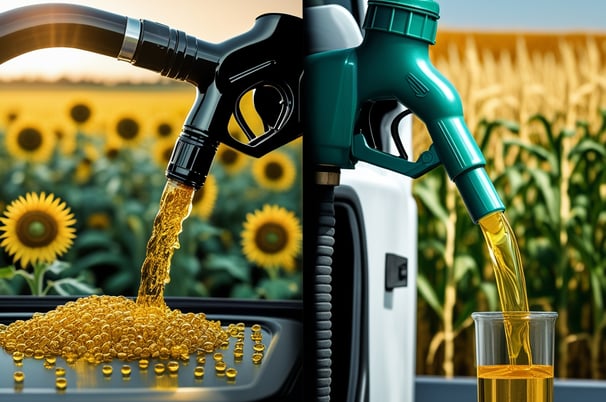Biodiesel vs. Ethanol: Which Biofuel is More Sustainable?
BIOFUELS


As the world transitions toward renewable energy sources, biofuels like biodiesel and ethanol have gained significant attention. Both are derived from organic materials and serve as alternatives to fossil fuels, but which one is more sustainable? Let’s compare their environmental impact, production efficiency, and overall sustainability.
What is Biodiesel?
Biodiesel is a renewable fuel made from vegetable oils, animal fats, or recycled cooking oil. It is commonly blended with petroleum diesel and used in diesel engines without major modifications.
Pros of Biodiesel:
Lower Carbon Emissions – Biodiesel emits fewer greenhouse gases than petroleum diesel.
Biodegradable and Non-Toxic – Spills cause minimal environmental harm.
Compatible with Diesel Engines – No need for significant engine modifications.
Cons of Biodiesel:
Higher Production Costs – More expensive than petroleum-based diesel.
Feedstock Competition – Uses food crops like soy and palm oil, which can impact food supply.
What is Ethanol?
Ethanol is an alcohol-based biofuel made primarily from corn, sugarcane, or other biomass. It is blended with gasoline to reduce emissions and improve combustion efficiency in standard gasoline engines.
Pros of Ethanol:
Reduces Dependence on Fossil Fuels – Widely used as a gasoline alternative.
Lower Carbon Monoxide Emissions – Helps improve air quality.
Renewable and Abundant – Made from fast-growing crops like corn and sugarcane.
Cons of Ethanol:
Lower Energy Content – Provides less energy per gallon than gasoline or diesel.
Water-Intensive Production – Requires significant water resources for crop cultivation.
Potential for Land Use Change – Large-scale production can lead to deforestation and habitat loss.
Which Biofuel is More Sustainable?
Both biofuels have environmental benefits, but sustainability depends on factors like land use, carbon footprint, and resource efficiency.
Biodiesel is more sustainable in terms of carbon reduction and compatibility with existing diesel engines, making it a preferred choice for transportation and industrial applications.
Ethanol, while renewable, has concerns related to land use, water consumption, and lower energy efficiency.
Final Verdict
The sustainability of biodiesel and ethanol depends on their source materials, production methods, and intended use. For reducing emissions in diesel-powered vehicles and machinery, biodiesel is the better option. However, for gasoline alternatives, ethanol remains a viable, albeit less efficient, solution.
Transitioning to biofuels is a step toward a greener future, and innovations in production technology will further enhance their sustainability. The key is to balance renewable energy with environmental responsibility and resource management.
